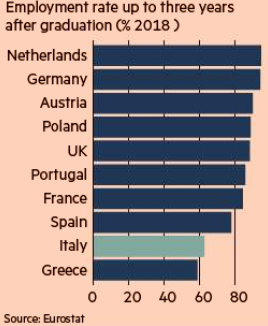I was kindly invited by student market research specialists, YouthSight, to present to a roomful of University marketers about what recruiters look for in graduate hires. The objective was to help the audience to better understand how their students can optimise their time at University and therefore increase their chances of employment. I shared three insights which I will explain here in more detail for my readers.
Firstly, let's start with a definition of employability. According to Wikipedia, employability refers to the attributes of a person that make that person able to gain and maintain employment. According to the FT, graduate employability is currently the fifth highest in Europe with 85% of graduates in employment three years after graduation. Not bad.

So, let's start with what the market is like right now as we near the end of 2019.
1. Record year. GRB have been supplying first-class graduate talent to recruiters for over 20 years. This year has been our best yet. Our clients were predominantly from the IT, Consulting and Finance sectors with the most in-demand degree being numerate discplines. The Universities who generated the most hires were mainly from the Russell Group and the majority of hires were made in London. Our success is down a combination of factors not least the favourable economic climate but also record talent shortages particularly around STEM graduates. According to the ISE there were 200,000 graduate level vacancies projected for 2019. As we near the end of the year we are seeing 55% saying that they are now having trouble filling all of their posts.
2. What recruiters’ want. I recently attend the REC Summit and their Director, Tom Hadley, said "employers want graduates with the right mindset to enable future growth. Being curious, having integrity and taking accountability for their actions are key. If they can articulate what they can offer they will get hired." Whilst I was there, I also spoke with the CEO of the World Employment Confederation (WEC), Denis Pennel, representing thousands of employers around the world. His answer was quite simply that graduates need to "hit the ground running."
In addition, the FT’s 2018 Skills Gap survey found that employers preferred candidates who as well as being able to problem solve and prioritise, could work in a team, with a wide variety of people and build a network. The frontier of science requires tenacity, resilience, intelligence. Constant failure with some successes teaches invaluable skills of life like nothing else. I decided to ask some of our own clients and run a survey which generated 358 responses to the question: What skills do you look for in graduates you hire? Here are the findings in order of importance.
1. Interpersonal skills
2. Problem solving and decision making
3. Teamwork
4. Ability to plan and organise
5. Business communication
6. Digital or technical skills
7. Commercial awareness
8. Negotiating and influencing
9. Dealing with conflict
10. Managing up
3. The Future
With so much economic, technological and political change right now a recession is seeming more likely for 2020 so how will all this affect the plans recruiters are making? Well, actually it's business as usual with many surveys projecting the same or increased levels of graduate hiring next year and a few, understandably, putting things on hold. I decided to survey some of our clients again asking them what concerns they had about recruiting graduates in 2020. Here are the results from 248 responses in order of importance.
1. Increased competition
2. BREXIT
3. Internal challenges
4. Candidate shortage due to demographics
5. Recession
6. Technological changes e.g. AI
7. Change of Government
With the war for talent clearly high on the agenda, graduates must not sit back. Even STEM graduates may not be safe. All students must invest in their futures by hoovering up skills at University to put them in the strongest possible position so they ultimately have a choice. In the future, the trick will be to find work that robots cannot do. Strong social skills will be in demand as technology takes over routine technical tasks, according to Nesta research. The type of skills employers will be recruiting for will evolve, with greater emphasis on interpersonal and cognitive skills, creativity and problem-solving. Whilst employability is a clear driver for studying a degree at University (73% Source: YouthSights) students must still remember that University is much more than that...it's about expanding the mind, and all employers value knowledge.




